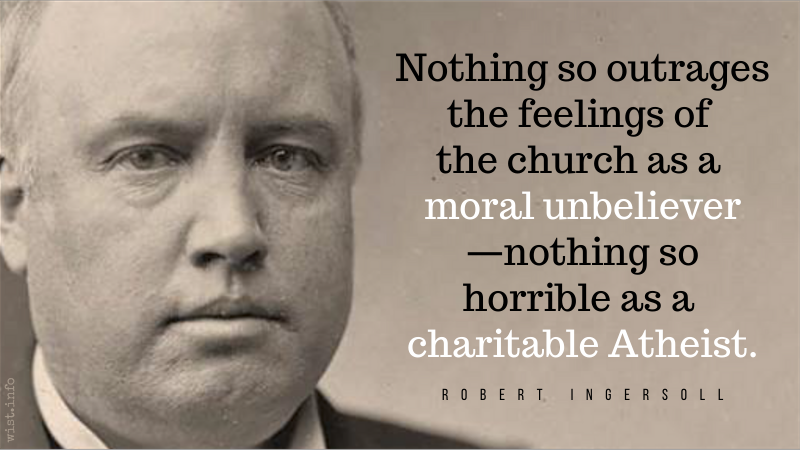Is it not possible that an individual may be right and a government wrong? Are laws to be enforced simply because they were made? or declared by any number of men to be good, if they are not good? Is there any necessity for a man’s being a tool to perform a deed of which his better nature disapproves? Is it the intention of law-makers that good men shall be hung ever?
Henry David Thoreau (1817-1862) American philosopher and writer
Speech (1859-10-30), “A Plea for Captain John Brown,” Concord, Massachusetts
(Source)
Speaking of John Brown and his raid on Harpers Ferry. Collected in A Yankee in Canada (1866).
Quotations about:
legalism
Note not all quotations have been tagged, so Search may find additional quotes on this topic.
PRECEDENT, n. In Law, a previous decision, rule or practice which, in the absence of a definite statute, has whatever force and authority a Judge may choose to give it, thereby greatly simplifying his task of doing as he pleases. As there are precedents for everything, he has only to ignore those that make against his interest and accentuate those in the line of his desire.
Ambrose Bierce (1842-1914?) American writer and journalist
“Precedent,” The Devil’s Dictionary (1911)
(Source)
Originally published in the "Cynic's Word Book" column in the New York American (1906-04-06), and the "Cynic's Dictionary" column in the San Francisco Examiner (1906-04-11).
The law will never make men free; it is men who have got to make the law free. They are the lovers of law and order, who observe the law when the government breaks it.
Henry David Thoreau (1817-1862) American philosopher and writer
Speech (1854-07-04), “Slavery in Massachusetts,” Anti-Slavery Celebration, Framingham, Massachusetts
(Source)
After the conviction in Boston of Anthony Burns, under the Fugitive Slave Act of 1850. This led to large protests and an abolitionist riot at the Boston Courthouse, requiring Federal troops and state militia to ensure Burns' transport to a ship sailing to Virginia.
In context, Thoreau is arguing the quality of a higher law, higher than the Fugitive Slave Law or Constitutional legalism from the courts -- the "law of humanity," which condemns the injustice of slavery.
But now persecution is good, because it exists; every law which originated in ignorance and malice, and gratifies the passions from whence it sprang, we call the wisdom of our ancestors: when such laws are repealed, they will be cruelty and madness; till they are repealed, they are policy and caution.
Sydney Smith (1771-1845) English clergyman, essayist, wit
The Letters of Peter Plymley, Letter 5 (1807)
(Source)
Pedantry prides herself on being wrong by rules; while common sense is contented to be right, without them.
Charles Caleb "C. C." Colton (1780-1832) English cleric, writer, aphorist
Lacon: Or, Many Things in Few Words, Vol. 1, § 48 (1820)
(Source)
We cannot, by total reliance on law, escape the duty to judge right and wrong [….] There are good laws and there are occasionally bad laws, and it conforms to the highest traditions of a free society to offer resistance to bad laws, and to disobey them.
Alexander M. Bickel (1924-1974) Romanian-American law professor, constitutional scholar
Politics and the Warren Court, Part 3, ch. 5 “Civil Rights and Civil Disobedience” (1965)
(Source)
In all such oaths we are not to attend to the mere form of words, but the true design and intention of them.
[Semper autem in fide quid senseris, non quid dixeris, cogitandum.]
Marcus Tullius Cicero (106-43 BC) Roman orator, statesman, philosopher
De Officiis [On Duties; On Moral Duty; The Offices], Book 1, ch. 13 (1.13) / sec. 40 (44 BC) [tr. Cockman (1699)]
(Source)
(Source (Latin)). Alternate translations:In obligations of faith, it is the meaning always, not the words that are to be considered.
[tr. McCartney (1798)]In a promise, what you thought, and not what you said, is always to be considered.
[tr. Edmonds (1865)]In a promise, what you mean, not what you say, is always to be taken into account.
[tr. Peabody (1883)]A promise must be kept not merely in the letter, but in the spirit.
[ed. Harbottle (1906)]In the matter of a promise one must always consider the meaning and not the mere words.
[tr. Miller (1913)]You should always, in a matter of trust, think of what you mean, not of what you say.
[tr. Edinger (1974)]
Pedantry prides herself on being wrong by rules; while common sense is contented to be right without them.
Charles Caleb "C. C." Colton (1780-1832) English cleric, writer, aphorist
Lacon: Or, Many Things in Few Words, Vol. 1, § 48 (1820)
(Source)
Nothing so outrages the feelings of the church as a moral unbeliever — nothing so horrible as a charitable Atheist.
Robert Green Ingersoll (1833-1899) American lawyer, freethinker, orator
“Thomas Paine” (1870)
(Source)
Injustice often arises also through chicanery, that is, through an over-subtle and even fraudulent construction of the law. This it is that gave rise to the now familiar saw, “More law, less justice.”
[Existunt etiam saepe iniuriae calumnia quadam et nimis callida sed malitiosa iuris interpretatione. Ex quo illud “summum ius summa iniuria” factum est iam tritum sermone proverbium.]
Marcus Tullius Cicero (106-43 BC) Roman orator, statesman, philosopher
De Officiis [On Duties; On Moral Duty; The Offices], Book 1, ch. 10 (1.10) / sec. 33 (44 BC) [tr. Miller (1913)]
(Source)
(Source (Latin)). Alternate translations:
But another great spring from which injuries arise, is some quirk or cavil, and an oversubtle and malicious interpretation of the laws; from whence that saying, "The height of justice is the height of roguery," is now become a daily and common proverb among us.
[tr. Cockman (1699)]Injustice is often done by artful evasions, and from a too shrewd, but malicious interpretation of the laws. Hence the proverb, "the strictest justice is the greatest injury," has become quite familiar in conversation.
[tr. McCartney (1798)]Very often wrongs arise through a quirk, and through a too artful but fraudulent construction of the law. Hence, "the rigour of law is the rigour of injustice," is a saying that has now passed into a proverb.
[tr. Edmonds (1865)]There are, also, wrongs committed by a sort of chicanery, which consists in a too subtle, and thus fraudulent, interpretation of the right. Hence comes the saying: The extreme of right is the extreme of wrong.
[tr. Peabody (1883)]A common form of injustice is chicanery, that is, an over-subtle, in fact a fraudulent construction of the law. Hence the hackneyed proverb: "The greatest right is the greatest wrong."
[tr. Gardiner (1899)]A perversion of justice, some extremely clever but harmful interpretation of a statute, also is a frequent cause of wrongdoing. Hence we have the saying, "Extreme legality is the worst law," a proverb become a cliche by daily use.
[tr. Edinger (1974)]
See Terence.
He took my seat and smiled again, like an affable crocodile. He was probably a very principled man, too. So were they all, all principled men. And women. There were few things more annoying than a visibly principled person. Or more troublesome. Most of the ones I’d met could have used a little uncertainty to dilute their principled-ness.
Jesus also told this parable to people who were sure of their own goodness and despised everybody else. “Once there were two men who went up to the Temple to pray: one was a Pharisee, the other a tax collector.
“The Pharisee stood apart by himself and prayed, ‘I thank you, God, that I am not greedy, dishonest, or an adulterer, like everybody else. I thank you that I am not like that tax collector over there. I fast two days a week, and I give you one tenth of all my income.’
“But the tax collector stood at a distance and would not even raise his face to heaven, but beat on his breast and said, ‘God, have pity on me, a sinner!’
“I tell you,” said Jesus, “the tax collector, and not the Pharisee, was in the right with God when he went home. For those who make themselves great will be humbled, and those who humble themselves will be made great.”[Εἶπεν δὲ καὶ πρός τινας τοὺς πεποιθότας ἐφ᾽ ἑαυτοῖς ὅτι εἰσὶν δίκαιοι καὶ ἐξουθενοῦντας τοὺς λοιποὺς τὴν παραβολὴν ταύτην· Ἄνθρωποι δύο ἀνέβησαν εἰς τὸ ἱερὸν προσεύξασθαι, ὁ εἷς Φαρισαῖος καὶ ὁ ἕτερος τελώνης.
ὁ Φαρισαῖος σταθεὶς πρὸς ἑαυτὸν ταῦτα προσηύχετο, Ὁ θεός, εὐχαριστῶ σοι ὅτι οὐκ εἰμὶ ὥσπερ οἱ λοιποὶ τῶν ἀνθρώπων, ἅρπαγες, ἄδικοι, μοιχοί, ἢ καὶ ὡς οὗτος ὁ τελώνης· νηστεύω δὶς τοῦ σαββάτου, ἀποδεκατῶ πάντα ὅσα κτῶμαι.
ὁ δὲ τελώνης μακρόθεν ἑστὼς οὐκ ἤθελεν οὐδὲ τοὺς ὀφθαλμοὺς ἐπᾶραι εἰς τὸν οὐρανόν, ἀλλ᾽ ἔτυπτεν τὸ στῆθος αὐτοῦ λέγων, Ὁ θεός, ἱλάσθητί μοι τῷ ἁμαρτωλῷ.
λέγω ὑμῖν, κατέβη οὗτος δεδικαιωμένος εἰς τὸν οἶκον αὐτοῦ παρ᾽ ἐκεῖνον· ὅτι πᾶς ὁ ὑψῶν ἑαυτὸν ταπεινωθήσεται, ὁ δὲ ταπεινῶν ἑαυτὸν ὑψωθήσεται.]The Bible (The New Testament) (AD 1st - 2nd C) Christian sacred scripture
Luke 18: 9-14, “The Parable of the Pharisee and the Tax Collector” [GNT (1992 ed.)]
(Source)
No Synoptic parallels.
(Source (Greek)). Alternate translations:And he spake this parable unto certain which trusted in themselves that they were righteous, and despised others: Two men went up into the temple to pray; the one a Pharisee, and the other a publican.
The Pharisee stood and prayed thus with himself, God, I thank thee, that I am not as other men are, extortioners, unjust, adulterers, or even as this publican. I fast twice in the week, I give tithes of all that I possess.
And the publican, standing afar off, would not lift up so much as his eyes unto heaven, but smote upon his breast, saying, God be merciful to me a sinner.
I tell you, this man went down to his house justified rather than the other: for every one that exalteth himself shall be abased; and he that humbleth himself shall be exalted.
[KJV (1611)]He spoke the following parable to some people who prided themselves on being virtuous and despised everyone else, "Two men went up to the Temple to pray, one a Pharisee, the other a tax collector.
"The Pharisee stood there and said this prayer to himself, 'I thank you, God, that I am not grasping, unjust, adulterous like the rest of mankind, and particularly that I am not like this tax collector here. I fast twice a week; I pay tithes on all I get.'
"The tax collector stood some distance away, not daring even to raise his eyes to heaven; but he beat his breast and said, 'God, be merciful to me, a sinner.'
"This man, I tell you, went home again at rights with God; the other did not. For everyone who exalts himself will be humbled, but the man who humbles himself will be exalted."
[JB (1966)]He spoke the following parable to some people who prided themselves on being upright and despised everyone else, "Two men went up to the Temple to pray, one a Pharisee, the other a tax collector.
"The Pharisee stood there and said this prayer to himself, 'I thank you, God, that I am not grasping, unjust, adulterous like everyone else, and particularly that I am not like this tax collector here. I fast twice a week; I pay tithes on all I get.'
"The tax collector stood some distance away, not daring even to raise his eyes to heaven; but he beat his breast and said, 'God, be merciful to me, a sinner.'
"This man, I tell you, went home again justified; the other did not. For everyone who raises himself up will be humbled, but anyone who humbles himself will be raised up."
[NJB (1985)]Jesus told this parable to certain people who had convinced themselves that they were righteous and who looked on everyone else with disgust: “Two people went up to the temple to pray. One was a Pharisee and the other a tax collector.
"The Pharisee stood and prayed about himself with these words, ‘God, I thank you that I’m not like everyone else—crooks, evildoers, adulterers—or even like this tax collector. I fast twice a week. I give a tenth of everything I receive.’
"But the tax collector stood at a distance. He wouldn’t even lift his eyes to look toward heaven. Rather, he struck his chest and said, ‘God, show mercy to me, a sinner.’
"I tell you, this person went down to his home justified rather than the Pharisee. All who lift themselves up will be brought low, and those who make themselves low will be lifted up.”
[CEB (2011)]He also told this parable to some who trusted in themselves that they were righteous and regarded others with contempt: “Two men went up to the temple to pray, one a Pharisee and the other a tax collector.
"The Pharisee, standing by himself, was praying thus, ‘God, I thank you that I am not like other people: thieves, rogues, adulterers, or even like this tax collector. I fast twice a week; I give a tenth of all my income.’
"But the tax collector, standing far off, would not even lift up his eyes to heaven but was beating his breast and saying, ‘God, be merciful to me, a sinner!’
"I tell you, this man went down to his home justified rather than the other, for all who exalt themselves will be humbled, but all who humble themselves will be exalted.”
[NRSV (2021 ed.)]
It is easier to make a saint out of a libertine than out of a prig.
George Santayana (1863-1952) Spanish-American poet and philosopher [Jorge Agustín Nicolás Ruíz de Santayana y Borrás]
The Life of Reason or The Phases of Human Progress, Vol. 3 “Reason in Religion,” ch. 11 “Spirituality and Its Corruptions” (1905-06)
(Source)
When man appears before the Throne of Judgment, the first question he is asked is not: “Have you believed in God?” or “Have you prayed and observed the ritual?” He is asked: “Have you dealt honorably and faithfully in all your dealings with your fellow man?”
I have spent all my life under a communist regime and I will tell you that a society without any objective legal scale is a terrible one indeed. But a society with no other scale but the legal one is not quite worthy of man either. A society which is based on the letter of the law and never reaches any higher is taking very scarce advantage of the high level of human possibilities. The letter of the law is too cold and formal to have a beneficial influence on society. Whenever the tissue of life is woven of legalistic relations, there is an atmosphere of moral mediocrity, paralyzing man’s noblest impulses.
Alexander Solzhenitsen (1918-2008) Russian novelist, emigre [Aleksandr Isayevich Solzhenitsyn]
“A World Split Apart,” Commencement Address, Harvard (8 Jun 1978)
(Source)
There is no man so good that if he placed all his actions and thoughts under the scrutiny of the laws, he would not deserve hanging ten times in his life.
[Il n’est si homme de bien, qu’il mette à l’examen des loix toutes ses actions et pensées, qui ne soit pendable dix fois en sa vie.]
Michel de Montaigne (1533-1592) French essayist
Essays, Book 3, ch. 9 (3.9), “Of Vanity [De la vanité]” (1587) [tr. Frame (1943)]
(Source)
First appeared in the 1588 edition.
(Source (French)). Alternate translations:No man is so exquisitely honest or upright in living, but brings all his actions and thoughts within compasse and danger of the lawes; and that tenne times in his life might not lawfully be hanged.
[tr. Florio (1603)]There is no so good Man, that so squares all his Thoughts and Actions to the Laws, that he is not Faulty enough to deserve Hanging ten Times in his Life.
[tr. Cotton (1686)]There is no so good man, who so squares all his thoughts and actions to the laws, that he is not faulty enough to deserve hanging ten times in his life.
[tr. Cotton/Hazlitt (1877)]There does not exist a man of such worth that, were he to lay open to the scrutiny of the laws all his actions and thoughts, he would not deserve hanging ten times in his life.
[tr. Ives (1925)]No man is so moral but that, if he submitted his deeds and thoughts to cross-examination by the laws, he would be found worthy of hanging on ten occasions in his lifetime.
[tr. Screech (1987)]


















